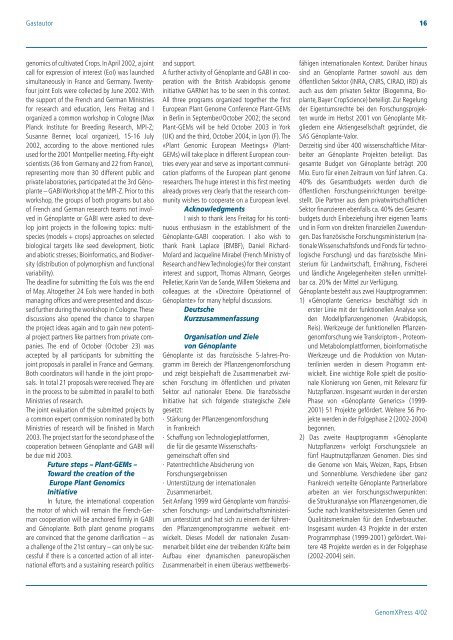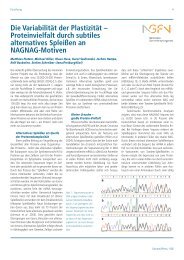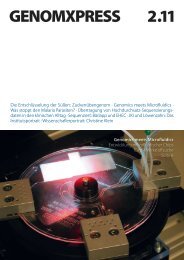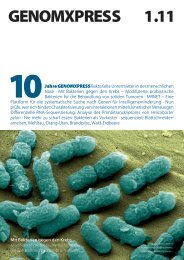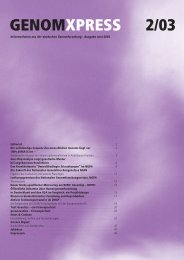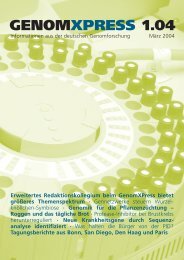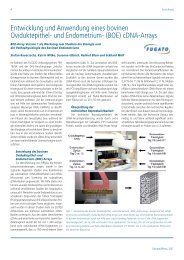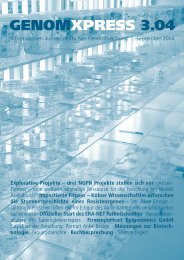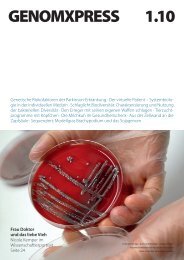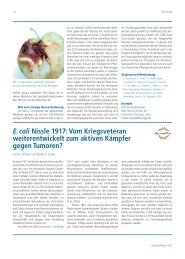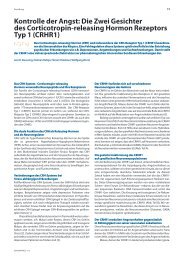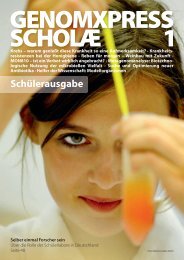Download GENOMXPRESS 4/2002
Download GENOMXPRESS 4/2002
Download GENOMXPRESS 4/2002
Erfolgreiche ePaper selbst erstellen
Machen Sie aus Ihren PDF Publikationen ein blätterbares Flipbook mit unserer einzigartigen Google optimierten e-Paper Software.
Gastautor 16<br />
genomics of cultivated Crops. In April <strong>2002</strong>, a joint<br />
call for expression of interest (EoI) was launched<br />
simultaneously in France and Germany. Twentyfour<br />
joint EoIs were collected by June <strong>2002</strong>. With<br />
the support of the French and German Ministries<br />
for research and education, Jens Freitag and I<br />
organized a common workshop in Cologne (Max<br />
Planck Institute for Breeding Research, MPI-Z;<br />
Susanne Benner, local organizer), 15-16 July<br />
<strong>2002</strong>, according to the above mentioned rules<br />
used for the 2001 Montpellier meeting. Fifty-eight<br />
scientists (36 from Germany and 22 from France),<br />
representing more than 30 different public and<br />
private laboratories, participated at the 3rd Génoplante<br />
– GABI Workshop at the MPI-Z. Prior to this<br />
workshop, the groups of both programs but also<br />
of French and German research teams not involved<br />
in Génoplante or GABI were asked to develop<br />
joint projects in the following topics: multispecies<br />
(models + crops) approaches on selected<br />
biological targets like seed development, biotic<br />
and abiotic stresses; Bioinformatics, and Biodiversity<br />
(distribution of polymorphism and functional<br />
variability).<br />
The deadline for submitting the EoIs was the end<br />
of May. Altogether 24 EoIs were handed in both<br />
managing offices and were presented and discussed<br />
further during the workshop in Cologne.These<br />
discussions also opened the chance to sharpen<br />
the project ideas again and to gain new potential<br />
project partners like partners from private companies.<br />
The end of October (October 23) was<br />
accepted by all participants for submitting the<br />
joint proposals in parallel in France and Germany.<br />
Both coordinators will handle in the joint proposals.<br />
In total 21 proposals were received.They are<br />
in the process to be submitted in parallel to both<br />
Ministries of research.<br />
The joint evaluation of the submitted projects by<br />
a common expert commission nominated by both<br />
Ministries of research will be finished in March<br />
2003.The project start for the second phase of the<br />
cooperation between Génoplante and GABI will<br />
be due mid 2003.<br />
Future steps – Plant-GEMs –<br />
Toward the creation of the<br />
Europe Plant Genomics<br />
Initiative<br />
In future, the international cooperation<br />
the motor of which will remain the French-German<br />
cooperation will be anchored firmly in GABI<br />
and Génoplante. Both plant genome programs<br />
are convinced that the genome clarification – as<br />
a challenge of the 21st century – can only be successful<br />
if there is a concerted action of all international<br />
efforts and a sustaining research politics<br />
and support.<br />
A further activity of Génoplante and GABI in cooperation<br />
with the British Arabidopsis genome<br />
initiative GARNet has to be seen in this context.<br />
All three programs organized together the first<br />
European Plant Genome Conference Plant-GEMs<br />
in Berlin in September/October <strong>2002</strong>; the second<br />
Plant-GEMs will be held October 2003 in York<br />
(UK) and the third, October 2004, in Lyon (F). The<br />
«Plant Genomic European Meetings» (Plant-<br />
GEMs) will take place in different European countries<br />
every year and serve as important communication<br />
platforms of the European plant genome<br />
researchers.The huge interest in this first meeting<br />
already proves very clearly that the research community<br />
wishes to cooperate on a European level.<br />
Acknowledgments<br />
I wish to thank Jens Freitag for his continuous<br />
enthusiasm in the establishment of the<br />
Génoplante-GABI cooperation. I also wish to<br />
thank Frank Laplace (BMBF), Daniel Richard-<br />
Molard and Jacqueline Mirabel (French Ministry of<br />
Research and New Technologies) for their constant<br />
interest and support, Thomas Altmann, Georges<br />
Pelletier, Karin Van de Sande,Willem Stiekema and<br />
colleagues at the «Directoire Opérationnel of<br />
Génoplante» for many helpful discussions.<br />
Deutsche<br />
Kurzzusammenfassung<br />
Organisation und Ziele<br />
von Génoplante<br />
Génoplante ist das französische 5-Jahres-Programm<br />
im Bereich der Pflanzengenomforschung<br />
und zeigt beispielhaft die Zusammenarbeit zwischen<br />
Forschung im öffentlichen und privaten<br />
Sektor auf nationaler Ebene. Die französische<br />
Initiative hat sich folgende strategische Ziele<br />
gesetzt:<br />
· Stärkung der Pflanzengenomforschung<br />
in Frankreich<br />
· Schaffung von Technologieplattformen,<br />
die für die gesamte Wissenschaftsgemeinschaft<br />
offen sind<br />
· Patentrechtliche Absicherung von<br />
Forschungsergebnissen<br />
· Unterstützung der internationalen<br />
Zusammenarbeit.<br />
Seit Anfang 1999 wird Génoplante vom französischen<br />
Forschungs- und Landwirtschaftsministerium<br />
unterstützt und hat sich zu einem der führenden<br />
Pflanzengenomprogramme weltweit entwickelt.<br />
Dieses Modell der nationalen Zusammenarbeit<br />
bildet eine der treibenden Kräfte beim<br />
Aufbau einer dynamischen paneuropäischen<br />
Zusammenarbeit in einem überaus wettbewerbsfähigen<br />
internationalen Kontext. Darüber hinaus<br />
sind an Génoplante Partner sowohl aus dem<br />
öffentlichen Sektor (INRA, CNRS, CIRAD, IRD) als<br />
auch aus dem privaten Sektor (Biogemma, Bioplante,<br />
Bayer CropScience) beteiligt. Zur Regelung<br />
der Eigentumsrechte bei den Forschungsprojekten<br />
wurde im Herbst 2001 von Génoplante Mitgliedern<br />
eine Aktiengesellschaft gegründet, die<br />
SAS Génoplante-Valor.<br />
Derzeitig sind über 400 wissenschaftliche Mitarbeiter<br />
an Génoplante Projekten beteiligt. Das<br />
gesamte Budget von Génoplante beträgt 200<br />
Mio. Euro für einen Zeitraum von fünf Jahren. Ca.<br />
40% des Gesamtbudgets werden durch die<br />
öffentlichen Forschungseinrichtungen bereitgestellt.<br />
Die Partner aus dem privatwirtschaftlichen<br />
Sektor finanzieren ebenfalls ca. 40% des Gesamtbudgets<br />
durch Einbeziehung ihrer eigenen Teams<br />
und in Form von direkten finanziellen Zuwendungen.Das<br />
französische Forschungsministerium (nationale<br />
Wissenschaftsfonds und Fonds für technologische<br />
Forschung) und das französische Ministerium<br />
für Landwirtschaft, Ernährung, Fischerei<br />
und ländliche Angelegenheiten stellen unmittelbar<br />
ca. 20% der Mittel zur Verfügung.<br />
Génoplante besteht aus zwei Hauptprogrammen:<br />
1) «Génoplante Generics» beschäftigt sich in<br />
erster Linie mit der funktionellen Analyse von<br />
den Modellpflanzengenomen (Arabidopsis,<br />
Reis). Werkzeuge der funktionellen Pflanzengenomforschung<br />
wie Transkriptom-, Proteomund<br />
Metabolomplattformen, bioinformatische<br />
Werkzeuge und die Produktion von Mutantenlinien<br />
werden in diesem Programm entwickelt.<br />
Eine wichtige Rolle spielt die positionale<br />
Klonierung von Genen, mit Relevanz für<br />
Nutzpflanzen. Insgesamt wurden in der ersten<br />
Phase von «Génoplante Generics» (1999-<br />
2001) 51 Projekte gefördert. Weitere 56 Projekte<br />
werden in der Folgephase 2 (<strong>2002</strong>-2004)<br />
begonnen.<br />
2) Das zweite Hauptprogramm «Génoplante<br />
Nutzpflanzen» verfolgt Forschungsziele an<br />
fünf Hauptnutzpflanzen Genomen. Dies sind<br />
die Genome von Mais, Weizen, Raps, Erbsen<br />
und Sonnenblume. Verschiedene über ganz<br />
Frankreich verteilte Génoplante Partnerlabore<br />
arbeiten an vier Forschungsschwerpunkten:<br />
die Strukturanalyse von Pflanzengenomen, die<br />
Suche nach krankheitsresistenten Genen und<br />
Qualitätsmerkmalen für den Endverbraucher.<br />
Insgesamt wurden 43 Projekte in der ersten<br />
Programmphase (1999-2001) gefördert. Weitere<br />
48 Projekte werden es in der Folgephase<br />
(<strong>2002</strong>-2004) sein.<br />
GenomXPress 4/02


